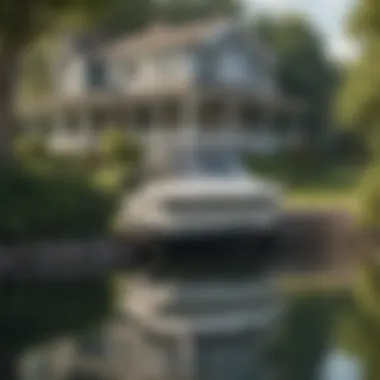Understanding Homeowners Insurance for Your Boat


Intro
Understanding insurance as it relates to boats can seem complicated. Many boat owners may not realize their homeowners insurance provides some level of protection. However, it's vital to dive into the specifics. By knowing the details, you can prevent potential risks that arise from unintentional gaps in coverage.
This section aims to clarify the principles behind homeowners insurance for watercraft. Exploring some important points will provide a foundation for better decision-making when selecting insurance options for boats.
Overview of Homeowners Insurance Coverage for Boats
Many homeowners insurance policies include coverage for boats under certain conditions. Notably, the coverage limits are often minimal. Most homeowners insurance covers small boats or personal watercraft. Understand that anything above than a set size may not be covered, or comes with restrictions.
An insurance customer should check the policy’s declarations page. Find clauses that pertain to “property damage” and “personal liability.” Ensure awareness of terms like “exclusions” and “deductibles.” Boat owners may miss hidden fees or premium increases tied to watercraft insurance.
Any potential gaps can significantly jeopardize your investment in a boat. Let’s explore how coverage works further.
Types of Homeowners Insurance Covering Boats
There are generally two types of insurance that relate to this subject.
- Deliberate coverage for personal watercraft
- Basic liability protection for personal use of a boat under some homeowners policies
Specifics of the Coverage Benefits
Commonly included protections in homeowners insurance regards leakage or damage during stored periods. However, watch for assertively high deductibles or exclusions related to larger vessels or unique types of boats.
Typically, the policy covers up to a limited amount. Often, up to $1,500, meaning owners with boats embeded with deeper value may need extra policy measures to completely protect their assets.
Check with your agent about these limits before making cessions in purchasing choices.
Comparative Analysis
When you look for insurance plans encompassing boats, it is essential to judge various homeowners insurance providers. Different providers will render diverging strategies, unique coverage amounts, and costs, creating differentiation regarding selected plans.
Comparison of Insurance Plans
To assess which homeowners plan best fits your needs, compare features across insurance companies. Take into account not just price, but coverage specifics. Ensure to review for:
- Coverage caps specific to boats.
- Types of accepted watercraft.
- Seasonal and geographical restrictions.
Gathering specific details helps homeonwners understand their limit exposures.
Key Considerations for Homeowners Insurance
While comparing personal watercraft coverage losses, carefully check:
- Costs: Monthly expenses may vary vastly by insurer, impacting long-term investment plans.
- Record: Past history or experience influences rates as policies may adjust based on common claims.
Expert Insights and Recommendations
Industry insiders frequently mention the need for homeowners permits to determine best practices in acquiring boat coverage. A multi-line or bundled policies often reduce overall payments significantly.
Additionally, data suggests successful boat owners participate in specialized boating liability plans. Thus, they ensure their exact needs are systematically fulfilled without surprising conditions.
Strategies for Financial Decisions
Selecting optimal insurance policies requires thought. Individuals need to recognize how much they use their boat.
How to Choose the Right Insurance
Important thoughts influence decisions over time:
- Understand size and type of your watercraft.
- Assess premium pressures versus costs.
- Plan how the weekends and local climate touch your boating habits.
Maximizong Credit Card Potential


Various warranties may exist depending on your credit cards regarding trip insurance or damage coverage once on non-major-policy boats. Take precautionary steps to maximize your pilot also on rotating consumer situations, monitoring updates ensure practice succumb.
Resources for Additional Learning
Stay ahead with specifics by referencing notable tools online. Examples include calculators, policy templates, and any educational articles from a credible source. Tools assist homeowners considering additional savings without delving excessively deep.
To enrich your understanding of homeowners insurance and its relation to boat ownership, visit Wikipedia, Britannica, or even Reddit forums. There, discussions may supply community contributions on recent experiences or misunderstood topics surrounding this form of coverage.
Through steady exploration, better protection results when it comes to safeguarding livelihood activities enjoyed on the water.
Preamble to Homeowners Insurance
Homeowners insurance serves as a fundamental pillar in protecting one's home and its contents. Understanding this aspect is critical, especially for those who own watercraft. The significant overlap between homeowners insurance and watercraft coverage can create questions about the extent of protection available. By exploring homeowners insurance through this lens, readers can understand how their existing policies apply to boats and what gaps might exist.
Definition of Homeowners Insurance
Homeowners insurance is a type of property insurance designed to provide financial protection against various risks for homeowners. This coverage typically includes protection against losses due to fire, theft, vandalism, and certain liabilities, such as injuries that occur on the insured property. Policies can vary, but they usually cover both the structure of the home and personal belongings within.
Homeowners insurance can also assist in repairs after accidents occurring on the property. Moreover, it plays an essential role in addressing unforeseen events, giving homeowners a sense of security in their investment.
Common Inclusions in Homeowners Insurance Policies
Homeowners insurance often includes several key elements that provide comprehensive coverage, including:
- Dwelling Protection: Coverage for the structure of the home and any attached structures. This is fundamental as it helps secure the overall investment.
- Personal Property Coverage: This element insures personal items in your home against loss or damage, albeit often subject to certain limits, particularly for high-value items.
- Liability Coverage: Homeowners insurance also protects against legal claims or expenses arising from injuries to others on your property. This can prevent significant financial losses in lawsuits.
- Additional Living Expenses: When a covered event displaces homeowners, this provision assists with living costs, like temporary housing.
Understanding these inclusions is vital for evaluating how homeowners insurance interacts with boat ownership. Recognizing these details aids policyholders in analyzing whether they need additional insurance for their watercraft or if their existing policy suffices. This foundational understanding sets the stage for assessing more specific boat coverage elements under homeowners insurance.
Examining Boat Coverage within Homeowners Insurance
Examining the coverage of boats under homeowners insurance is a critical aspect for anyone considering navigating the waters, whether for leisurely trips or more engaging water activities. Understanding this topic can prevent gaps in protection. Not every policy offers comprehensive coverage for watercraft. Homeowners often overlook the specific benefits and considerations of boat coverage, leading to potential financial risks.
Typically, homeowners insurance primarily focuses on the home and its contents. However, boat coverage may be included, depending on the policy. It is essential to evaluate whether standard homeowners policies truly cater to all needs related to boat ownership. Knowing the extent of this coverage might result in better risk management and informed decision making.
Standard Policy Coverage for Boats
Homeowners insurance does provide some level of coverage for personal property, which may include boats. Generally, boats may be covered for a limited amount and include basic liabilities like theft or certain damages. Standard homeowners policies often cover only small boats, such as canoes and kayaks, under personal property. Typical exclusions might involve higher-value vessels, such as larger motorboats and yachts.
Key features of standard policy coverage might include:
- Personal Property Limitation: Boats are typically capped at low amounts, often around $1,000.
- Damage Protection: Covers incidents of loss due to fire, vandalism or theft.
- Liability Coverage: This addresses at-fault accidents that cause harm or damage to another person or property while operating the boat.
However, preparation is vital. Since more sizable boats often present greater risk exposure, the Homeowners Insurance Policy may not provide sufficient coverage in these cases.
Types of Boats Covered by Homeowners Insurance
Different types of boats may fall under the purview of homeowners insurance. Each type brings its nuances regarding the extent of coverage:
- Small Vessels: Items like canoes, kayaks, and inflatable boats are typically among those most frequently covered by standard policies at low coverage limits.
- Sailboats: These may also be included. Yet again, policies often restrict the declared value that is covered.
- Powerboats: Exempt from many traditional homeowners policies, ensuring adequate coverage often depends on valuing the actual cost of this type of boat.
- Yachts and Larger Vessels: Generally seen as higher risks, they may necessitate a separate contract dedicated explicitly to watercraft.
Boat owners should clarify will their agents. The types of boats included in the homeowners insurance will vary widely among policies and might ultimately require the procurement of additional boat insurance to cover the full risk.
Gap Analysis: Homeowners Insurance vs.
Boat Insurance
Understanding the distinctions between homeowners insurance and specialized boat insurance is crucial for effective risk management. Many individuals tend to assume that their existing homeowners insurance policy fully covers their watercraft. However, this assumption can lead to significant gaps in coverage when unexpected incidents occur. Clarifying the nuances between the insurance types ensures boat owners do not find themselves in precarious situations when seeking compensation after an accident or damage.
Limitations of Homeowners Insurance for Watercraft
Homeowners insurance policies often present a limited scope of protection regarding watercraft. Many policies may cover small components or particulars of boating, yet we must acknowledge these limitations. Key points to consider include:
- Coverage Limits: Most homeowners insurance policies set predetermined limits on the monetary value of boats. For example, if an individual has a policy with a limit of $1,500, any damage exceeding that amount will have to be out of pocket. High-value boats may hence require separate insurance to ensure full protection.
- Exclusions: Certain types of boats, like personal watercraft or larger vessels, may not be eligible for homeowners coverage at all. Many policies state explicitly which crafts are deemed acceptable. Understanding these exclusions is paramount.
- Damage Types: Typical homeowners insurance does not encompass all possible scenarios of boat damage, such as while towing or during waterway mishaps. Definitions of
Types of Boat Insurance Policies Available


Boat insurance is paramount for any watercraft owner. It offers forms of financial protection against event impacting the boat, or related liabilities. Numerous policies cater specifically to the needs of boat owners. In this section, we will explore three main types of boat insurance policies: Liability Coverage, Physical Damage Coverage, and Uninsured/Underinsured Boater Coverage. Delving into these offerings helps inform decisions regarding insurance based on individual circumstances.
Liability Coverage
Liability coverage insures the boat owner against legal claims in the event of property damage or injuries inflicted on another person while using the boat. This insurance becomes essential on busy waterways, as collisions with other boats or accidents involving swimmers can escalate into costly lawsuits. The coverage typically encompasses legal fees and settlement costs arising from such incidents. It is crucial for boat enthusiasts to understand their specific liability needs and potential risks associated with using their boat, ensuring that they select a policy providing adequate coverage limits.
- Essential benefits of liability coverage include:
- Protection from substantial financial loss due to accidents.
- Assistance with navigating legal complexities in case of a lawsuit.
- Coverage for damages incurred to other vessels or properties owned by third parties.
Physical Damage Coverage
Physical damage coverage protects against damages sustained to the boat. This includes scenarios like collisions, weather-related incidents, or theft. There are two primary forms of physical damage coverage: Total Loss Coverage and Repair Cost coverage. Total Loss Coverage pays the insured limit if the boat is deemed a total loss, while Repair Cost coverage disburses funds for covered repairs, potentially only up to the current value.
Insuring physical damages can also provide peace of mind for boat owners navigating hazardous conditions, drifting to shores with debris, or coming close to rocks.
Key points regarding physical damage coverage:
- Could be valuable for those using expensive, high-performance boats.
- Policy inclusions often extend to optional accessories added to the boat, like electronic devices.
- Policyholders may consider higher deductibles to reduce premiums, balancing cost against risk exposure.
Uninsured/Underinsured Boater Coverage
This coverage surrounds several contingencies emerging when accidents are caused by uninsured or underinsured boaters. If the policyholder finds themselves involved in a misadventure, the option of being compensated for damages becomes vital, particularly if an at-fault party not have insurance.
- Enumerted features of Uninsured/Underinsured boater coverage include:
- Coverage for medical costs not covered by other insurances.
- Desirable protection wehn navigating expanses with varied insurance practices among fellow boaters.
- Aiding owners facing costly repairs while other required parties neglect financial responsibilities.
Choosing the right combination of these insurance types safeguards boaters' financial livelihood, and even safety on the water. Detailed exploration provides insight into requirements and confidence in policy selections.
Assessing the Necessity of Separate Boat Insurance
Homeowners insurance often provides valuable coverage for boats. However, for many, this may not be enough. Therefore, assessing the necessity of separate boat insurance becomes crucial. Such an evaluation allows boat owners to truly understand what they need for their unique situation.
Evaluating Risk Factors
When considering whether to obtain separate boat insurance, one must reflect on numerous risk factors. Assessing the environment where the boat is primarily used plays a significant role. Is it on a lake, ocean, or river? Each of these settings has its own challenges. Furthermore, the type of boat also matters. Smaller personal watercraft may experience different risks compared to larger fishing or sailing vessels. Differentiating between these types ensures that the necessary support for any incident is known.
Unforeseen situations can arise. Weather conditions, accidents, or even theft are possibilities many owners face, which ca impact their decision. High theft rates in certain areas might push individuals to consider a more comprehensive policy. Knowledge of local water regulations or weather patterns would contribute to an informed choice as well, highlighting the need to evaluate both risks and environment.
Cost-Benefit Analysis of Boat Insurance
Conducting a cost-benefit analysis can help clarify the choice to purchase separate boat insurance. The peace of mind provided by knowing that you're covered against specific risks can be worth the expense. For most buyers, the question lies in the budgeting aspect versus potential out-of-pocket expenditures.
Boats often experience damage due to accidents. Expenses for repair can strain finances significantly. For example, underwater damage or hull repairs are likely expensive occurrences. Examining premiums against possible repair costs allows owners to weigh their options logically. If the combined expenses of accidents and damages from navigating unpredictable waters exceed coverage costs, obtaining separate insurance seems more sensible.
Additionally, it is essential to consider available discounts from insurers based on boating experience. Those with a history of safe boating might find more advantageous premium rates than they would through a homeowners policy. Any savings can alter the cost-benefit equation to favor distinctly specialized boat insurance policies.
How to Choose the Right Insurance Policies
Choosing the right insurance policies for your boat is crucial. It involves understanding the coverage options available and evaluating the specifics based on your needs. Many boat owners might assume that homeowners insurance automatically protects their watercraft. However, this assumption could lead to gaps in coverage. It's essential to navigate this topic carefully to ensure comprehensive protection.
Comparing Coverage Options
The first step in selecting an insurance policy revolves around comparing coverage options. Different policies offer varying extents of protection. Standard homeowners insurance might cover a small amount of personal liability for boats kept on your property. However, for broader coverage, you may need to explore specific boat insurance plans.
Here are elements to consider when comparing coverage options:
- Types of Damage Covered: Ensure you understand what incidents are covered under various policies. Typical options include physical damage from collisions, theft, and vandalism.
- Liability Coverage: This is crucial for boats. Ensure your policy covers potential injuries to others or damage to their property resulting from your boat's operation.
- Geographical Limits: Some policies may limit coverage to specific waterways. Make sure the areas where you plan to navigate are covered.
- Additional Features: Look for policies offering extras like medical payments for you and your passengers or coverage for equipment onboard such as fishing gear or navigational devices.
By researching the unique facets of each insurance option, boat owners can make informed choices that align with their sailing habits and potential risks.
Consulting with Insurance Agents


The expertise of insurance agents is invaluable while navigating the waters of boat insurance. Consulting with a licensed agent can bridge knowledge gaps and reveal insights specific to your situation. Agents can clarify misunderstandings and help customize coverage.
Here are some reasons why consulting with an insurance agent is beneficial:
- Personalized Assistance: Agents can assess your unique needs based on your boat type, usage frequency, and where you sail. They can suggest policies tailored to those specifics.
- Understanding Complexity: Navigating both homeowners and boat insurance requires a strong grasp of nuanced policy language, including exclusions and endorsements. Insurance agents alleviate confusion, ensuring you understand what to expect from your coverage.
- Cost Insights: Agents can contribute perspectives on pricing. Having them guide your discussions could help you find coverage that delivers optimal protection while remaining within budget.
Ultimately, engaging with an insurance agent not only enhances your understanding but can also aid in securing the most appropriate policy that addresses your boat’s insurance characteristics.
Comprehensive coverage tailored to individual needs is pivotal for boat owners to ensure risk management and possession protection.
Understanding Policy Exclusions
Understanding policy exclusions in homeowners insurance is crucial for boat owners who want comprehensive coverage for their watercraft. Exclusions can significantly affect how much protection insurance provides in unexpected situations. It is essential to understand not only the common exclusions in homeowners insurance but also any specific exclusions that might apply to boats.
Common Exclusions in Homeowners Insurance
Homeowners insurance typically covers damage or loss to the home and personal property but contains several standard exclusions that policyholders should be aware of. Below are some common exclusions:
- Flood damage: Most homeowners insurance policies do not cover flooding, which is pertinent for individuals living in flood-prone areas.
- Earthquake damage: Similar to flood damage, earthquakes are generally excluded from standard coverage.
- Intentional damage: Any damage inflicted on property purposely is not covered.
- Neglect or poor maintenance: Many policies exclude claims related to deterioration from neglect.
- Business activities: If a homeowner runs a business from their house, related property can often be excluded.
Understanding these exclusions helps homeowners in the decision-making process regarding additional coverages needed.
Many homeowners mistakenly assume their insurance covers all risks associated with owning a boat, neglecting to read the exclusions.
Boat-Specific Exclusions in Policies
Habits and plans change, and so do boats. Therefore, exclusions may vary based on the type of boat and its intended use. It’s important to know what standard homeowners insurance will not cover regarding boats:
- Watercraft used for commercial purposes: Boats used for a business, such as rental or guided tours, often face exclusions.
- Higher risk activities: Specific activities, such as racing or engaging in stunts, can lead to exclusions if they are considered high risk.
- Type of vessel: Smaller vessels may have different exclusions compared to larger yachts concerning accidents or theft.
- Negligent operation of the boat: Claims may be voided if it is determined the boat owner was negligent when operating the watercraft.
Recognizing these specific exclusions ensures that boat owners maintain adequate protection against risks that standard homeowners insurance might overlook.
Legal Considerations for Boat Owners
Legal considerations are crucial for boat owners, particularly when interacting with insurance policies. Boats are not just recreational items; they can pose liabilities. Understanding local laws and regulations is essential to navigate potential legal pitfalls that can arise from incidents while using watercraft. By recognizing these elements, owners can better protect themselves and their assets.
Local Laws and Regulation Compliance
Boat owners must first be aware of local laws governing boating. These regulations vary significantly by state, province, and even local jurisdictions. Regulatory requirements may include boat registration, safety equipment mandates, and boating licenses. Rules typically address areas such as:
- Boat registration: Most places require boats to be registered, similar to vehicles.
- Safety equipment: Laws often stipulate required safety gear, such as life jackets, distress signals, and fire extinguishers.
- Boating licenses: Some regions mandate licenses or permits for operating certain types of vessels.
Compliance with these laws ensures that boat owners not only avoid fines or penalties but also maintain coverage from their insurance provisions. Non-compliance can lead to legal issues that compromise coverage in the event of an accident.
Impact of Legal Requirements on Insurance Needs
Legal requirements significantly dictate what boat owners must consider when choosing insurance options. For instance, if local laws mandate specific types of coverage or limit liability, this will directly affect policy selections. Some impacts include:
- Liability Coverage Requirements: Some states enact minimal liability coverage for all vessels to ensure that individuals can cover expenses arising from accidents.
- If requirements evolve, boat owners must adapt their policies to comply, reinforcing why tailored insurance coverage in response to local laws is crucial.
- Premium Adjustments: As the legal landscape changes, so might premiums. In areas with strict regulatory compliance, premium rates could reflect an increased risk pool related to non-compliance claims.
It is vital for boat owners to routinely assess legal requirements specific to their region, updating their insurance methods as needed.
Ending: Making Informed Insurance Choices
When it comes to homeowners insurance coverage for boats, understanding the specifics is vital. Making be informed choices can significantly impact financial protection and peace of mind. One common error is believing that a family's homeowners policy entirely covers their watercraft, but gaps often exist, leaving owners exposed to liabilities or damages that unexpected events may cause.
Key considerations include the varying coverages provided by different policies, the potential exclusions, and the influence of state laws regarding watercraft ownership. Evaluating these aspects allows homeowners to recognize where additional coverage or specialized policies may be necessary. Furthermore, recognizing the differences between homeowners and boat insurance is crucial, particularly in terms of liability risks. Notably, boat insurance often includes protections that homeowners policies don’t fully offer, which are critical for safeguarding a vessel on open water.
Making informed choices allows boat owners to not only protect their property but also to navigate the complexities of insurance processes effectively.
Summary of Key Points
- Homeowners insurance can provide limited coverage for boats, typically for small, non-motorized vessels.
- Standard policies may exclude reasonable coverage limits for damage or missing equipment on boats.
- Boat insurance includes specific protective elements like comprehensive coverage for different types of watercraft and personal property.
- Legal obligations regarding boat ownership can interject the choice of insurance and necessary coverage.
- Liability coverage is essential; homeowners policies might not cover damages that occur while operating a boat.
Final Recommendations for Boat Owners
When deciding on insurance, boat owners should:
- Assess their current homeowners policy to determine the extent of coverage for their boats. Review exclusions carefully to clarify what may be lacking.
- Consult insurance agents with relevant expertise specific to watercraft, gaining insights into the ideal coverage required for personal circumstances.
- Consider the frequency and environment of boat usage. Owners using a boat predominantly in open waters might need more extensive coverage than those using them in calm, inland lakes.
- Look into separate boat insurance policies that may offer additional resources for personal liability coverage and physical damages incurred on water.
- Stay informed about local laws that may require specific insurances or permits for boat ownership and operating.
By carefully weighing these options, boat owners can formulate disaster-management strategies in advance and mitigate potential risks.







